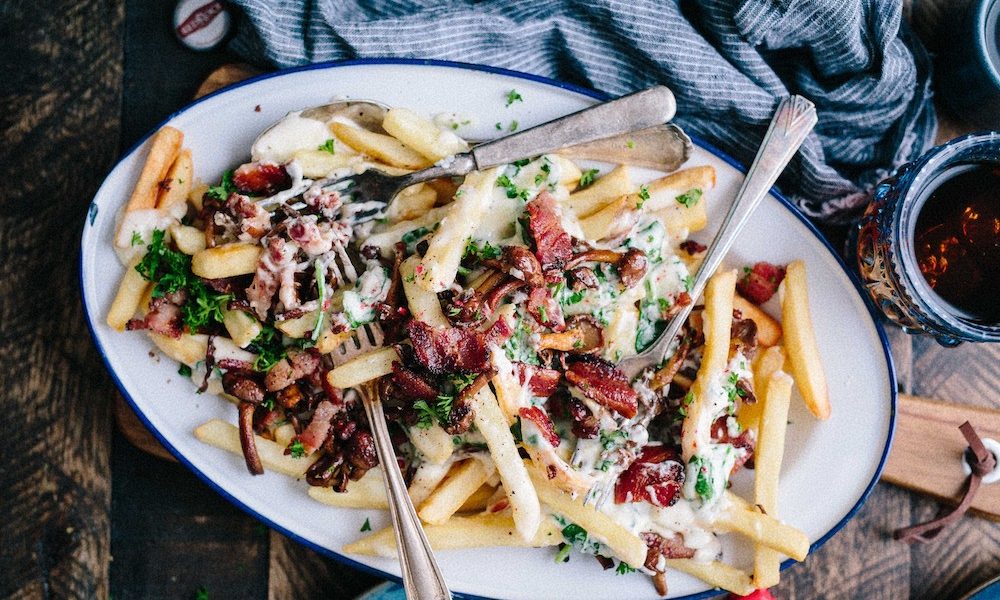If overdoing ‘guilty pleasures’ are part of the weekend norm, it’s time to take a step back and ask why. Here’s why your food binge is happening, and what you can do about it.
BY: RACHAEL HARTLEY, RD, LD, CDE
Do you ever save up food “splurges” for the weekend? While this may seem like a healthy way to eat all the foods you love while ‘feeling’ like you’re in control, it hardly ever works out.
That’s because your weekends essentially become a giant “cheat meal.”
They are used as a way to overeat the foods you restricted over the week, all while disconnecting yourself from the foods you enjoy as you make food choices from either a place of restriction (what you’re “allowed” to eat during the week), or an impulsive backlash to that restriction.
You find yourself feeling miserable on weekends after bingeing, and weekdays because, well, you’re hungry.
Now, it makes perfect sense that weekend eating will look different because of less structured schedules, more travel, and meeting up with other people. It becomes an issue when the guilt and shame over weekend eating leads to intentional restriction during the next week.
It’s the diet pendulum swinging back and forth, the restriction leading to next weekend’s binge, with the endless cycle starting all over again. So much emphasis is placed towards stopping or compensating for you perceived overeating, when in reality, it’s the restriction that’s causing the binge.
So what exactly is a binge?
A binge is characterized by eating a significant amount of food in a discrete period of time until one feels uncomfortably full. It’s often accompanied by a sense of lack of control, and significant shame afterward.
A diagnosis of binge eating disorder may be made if someone experiences a binge on average, once a week for at least 3 months. It’s possible to experience binge eating without having a diagnosis of binge eating disorder, as it’s also possible to eat until uncomfortably full without it being a binge. No matter where you fall in this spectrum, here are a few ways to stop binging on the weekend.
1. STOP STARTING ALL OVER MONDAY.
The first step it to stop trying to compensate for last weekend. When Monday rolls around, sure, it may be helpful to have some kind of plan in place for how you’ll feed yourself the next week. However, that plan should not be rooted in trying to undo what you ate over the weekend (or saving up for the next).
2. DO “WEEKEND THINGS” ON A WEEKDAY.
If you’re binging on the weekends, chances are you have some foods that you’re not letting yourself eat during the week. What are the foods you find yourself binging on over the weekend? Try to intentionally incorporate these foods during the week.
If it’s possible, try to do some weekend activities during the week, like going out to eat or having a get together with friends. This will help you get in some practice outside of the weekend, and to help break their association with the weekend.
3. DON’T FORGET TO EAT BREAKFAST.
If you sleep in later on the weekend, it’s really easy to skip breakfast. Try to eat something within about an hour of getting out of bed, whether it’s breakfast, brunch, or lunch. After that, continue to feed your body consistently throughout the day. It doesn’t matter if under-eating is intentional or unintentional, because an underfed body can trigger a binge.
4. HAVE OTHER WAYS TO DECOMPRESS AFTER WORK.
Food can be a way to relax, and that’s OK! But it’s also nice to have other tools in your self care toolbox. Try scheduling a Friday night yoga class, a post-work glass of wine with a friend, or take the dogs to the park.
5. CONSIDER HOW ALCOHOL PLAYS A ROLE.
It’s important to be aware of how drinking may affect you. Alcohol decreases ghrelin, a hunger hormone, so you may undereat and wake up the next morning feeling pretty hungry. It also causes your blood sugar to drop the next day, hence the morning-after starchy carb cravings. This is totally normal, and in the absence of fatphobia, can be an enjoyable and satisfying eating experience!
Another thing to get clear on is whether you’re using alcohol as an excuse to binge. Are you intentionally drinking more to give yourself an “excuse” to eat the foods you wouldn’t normally allow yourself to eat?
6. GIVE YOURSELF A BIG DOSE OF COMPASSION.
Imagine someone else ate the same food that you did – does it still feel concerning, or are you simply being hard on yourself? Can you identify any restrictions or other factors that led up to the binge? What could you do differently next time? Could this be a nudge towards giving yourself more freedom around food during the week? Weekends can be tricky with navigating food and eating, and one day (or weekend!) of eating is not going to make or break your health.
Remember, if you’ve struggled with binge eating on the weekends, it will take time to undo the mindset. Wherever you’re at, just remember that you only live once.
It’s OK to make the most out of your weekends.
Adapted from the original article.
HEADER IMAGE: BROOKE LARK
Rachael Hartley, RD, LD, CDE is a private practice dietitian, food enthusiast, and nutrition expert based in Columbia, SC. By guiding others to rediscover the joy of nourishment rather than deprivation, Rachael helps men and women alike improve their health and well-being through delicious whole food recipes and practical advice through intuitive eating.

